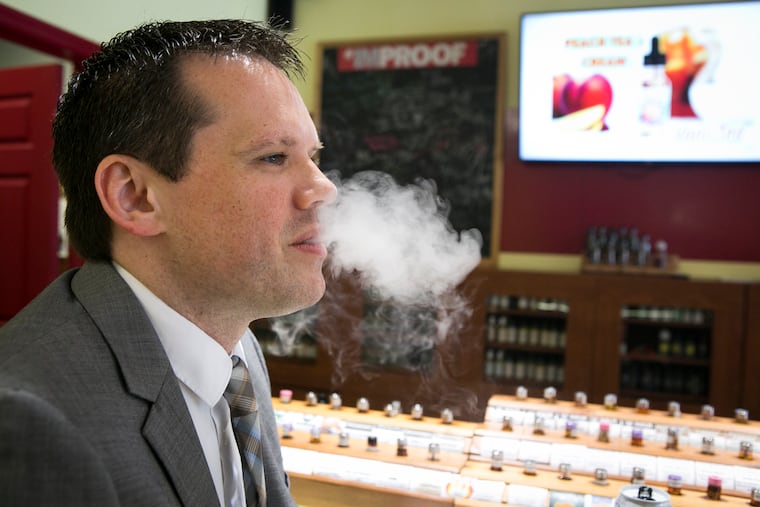Meet America’s vaping ‘superhero.’ He’s from South Jersey
Greg Conley stopped smoking and discovered a career.

When vaping enabled him to finally stop smoking 10 years ago, Greg Conley saw the light.
"I immediately became kind of evangelical about it," said the personable 31-year-old Medford lawyer, who's the founder and president of the American Vaping Association.
"I'm not an anti-smoker," he said. "Smokers don't respond to that. What I'm saying is, if you wish to quit, vaping is a great method. Not, 'You should stop smoking.'"
I met Conley at Firehouse E-cigs & Vapors on Route 38 in Cherry Hill. Compact, battery-powered delivery devices and pretty little vials of flavored, nicotine-enriched fluid are displayed like fine jewelry inside the bustling shop's glass cases.
What with the vapers coming and going, and the agreeably communal vibe of the place, one could easily conclude that vaping, which does not involve burning tobacco and ingesting its toxic smoke, is a rather robust enterprise.
Turns out that not everyone sees vaping's recent … cachet in some quarters as a salutary development.
"The FDA and the anti-smoking industry are trying to kill it," said Conley, warning that a product "that is saving the lives of smokers" could be regulated or taxed to death.
A lawyer who earned an M.B.A. and a law degree from Rutgers-Camden, Conley founded the association in 2013. He taught himself the intricacies of the regulatory, legislative, and political process, as well as the ins and outs of dealing with the media.
"I always feel smug saying this, but I'm the most quoted person in U.S. news media on the subject of vaping," he said.
No wonder some vapers refer to him as a "superhero," a term he neither uses nor seems to mind hearing.
"I've probably given 1,000 media interviews. I've been to all 50 states. I take a couple of international trips annually — I was in Qatar earlier this year, and I'm heading to South Africa," said Conley. "This is so much better than an ordinary job."
Sure sounds like it.
But is vaping, the name for inhaling nicotine-infused water vapor created by those handheld electronic devices on display at Firehouse and other vape shops, as beneficent as Conley believes? Is opposition to vaping, some of it from progressive anti-smoking advocates, merely what Conley calls "busybody, nanny-state stuff"?
Or is it instead a common-sense cautiousness about a new technology's popularity, particularly among the young?
Consider the brand Juul, whose website includes a quote calling the slick devices "the iPhone of e-cigarettes." Amid stern "adults only" and "nicotine is an addictive drug" warnings, the site also showcases videos and photos of diverse, mostly youthful looking, people blissfully puffing away.
Elsewhere, headlines have described the brand not only as having gone viral among young people — but tempting them to smoke cigarettes, too.
Conley and others liken this contention to the marijuana-leads-to-insanity fears of the Reefer Madness era. He cites other headlines, such as those generated by Britain's Royal College of Physicians and its conclusion that vaping is far less hazardous than cigarette smoking.
"The hysteria over Juul has largely been manufactured by activist organizations that are concerned with banning products rather than improving public health," Conley said.
He is forthright about the fact that his nonprofit association does accept money from e-cigarette manufacturers, but "nobody gets to dictate" its positions on the issues, he said.
But Conley would not say whether Juul is among those that fund the association, citing what he described as a nondisclosure policy.
And like Juul, he took pains to emphasize that only people who would otherwise be smoking choose vaping. Which reminded me, fairly or not, of the way Big Tobacco used to claim it was merely in the business of providing products to folks who already were smoking, and not about trying to persuade nonsmokers to light up.
Look, like Conley, I'm a former cigarette smoker. After years of on-again, off-again, I lit my last Marlboro on Sept. 1, 2008, and haven't inhaled since. But when I told friends, including several reformed smokers, that I was doing an interview at a vape shop, they asked if I planned to sample the product.
I told them there's no way I would take a chance on reactivating that extensive, and expensive, nicotine addiction.
Conley prefers the term dependence, and freely acknowledges that vaping does create it, albeit without the toxicity associated with sucking hot smoke through a burning paper tube packed with processed tobacco.
"When I was in law school, I tried to stop smoking, but the [cessation] products just didn't work for me, and I would go back to smoking," he recalled.
"The kind of smokers who switch to vaping are the type who try to quit and then relapse," Conley said. "Nicotine usage in smoke-free form may be a better solution for many smokers than just going cold turkey and hoping for the best."
Vaping as a harm reduction measure? I get that. I support it.
Vaping as a desirable lifestyle choice?
I don't — and won't — buy it.